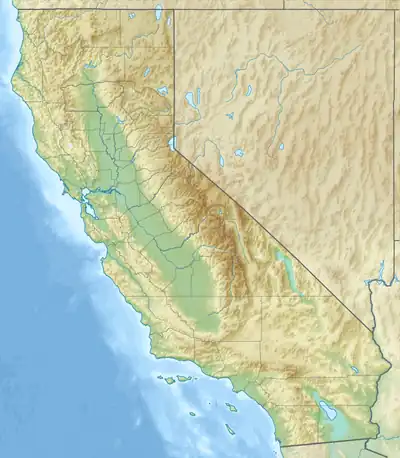| Corral Hollow Creek Buenos Ayres Creek | |
|---|---|
 Location of the mouth of Corral Hollow Creek in California | |
| Native name | Arroyo De Los Buenos Aires/Ayres (Spanish) |
| Location | |
| Country | United States |
| State | California |
| Counties | Alameda, San Joaquin |
| Physical characteristics | |
| Source | Head of Corral Canyon |
| • location | 1.9 mi (0 km) north of Mount Boardman, San Joaquin County |
| • coordinates | 37°30′34.02″N 121°28′49.37″W / 37.5094500°N 121.4803806°W[1] |
| Mouth | Delta-Mendota Canal |
• location | 4.3 miles South of Tracy, California, San Joaquin County |
• coordinates | 37°40′42″N 121°25′58″W / 37.67833°N 121.43278°W[1] |
• elevation | 197 ft (60 m)[1] |
| Length | 21.39 mi (34.42 km) |
Corral Hollow Creek, originally El Arroyo de los Buenos Ayres (The Creek of the Good Winds), later Buenos Ayres Creek, is a stream and tributary of the San Joaquin River, flowing through Alameda County and San Joaquin County, Central California.
Geography
The creek's headwaters are in the eastern slopes of the Diablo Range, and its confluence with the San Joaquin River is in the San Joaquin Valley.
Course
Its source is in Corral Canyon, 1.9 miles (3.1 km) north of Mount Boardman in San Joaquin County. It then flows north 1.89 miles where it turns to flow west-northwest 8.5 miles (13.7 km) into Alameda County and Corral Hollow, then turns abruptly east in the vicinity of Tesla to flow 2.5 miles (4.0 km) east, into San Joaquin County again, and another 2.5 miles to where it turns again in a northeasterly direction for 6 miles (9.7 km) to the Delta-Mendota Canal, 4.3 miles (6.9 km) south of Tracy, California, in the San Joaquin Valley.[1]
History
Named Arroyo de los Buenos Ayres or Aires by the Spanish, the creek retained this name despite the arrival of the Americans and the 49ers for some time. The name "Arroyo Buenos Ayres" appears on the Charles Drayton Gibbes' "Map of the Southern Mines" in 1852.[2] However an 1857 map of California shows the canyon was now named Corral Hollow, but Buenos Aryes Creek, although anglicised, remained with its old name.[3] By 1873 a State Geological Survey map indicated the name change was complete to Corral Hollow Creek.[4]
References
- 1 2 3 4 "Feature Detail Report for: Corral Hollow Creek". Geographic Names Information System. United States Geological Survey, United States Department of the Interior. Retrieved November 8, 2011.
- ↑ Map of the southern mines: (Calif.) 1852 by Charles Drayton Gibbes, The Bancroft Library, University of California, Berkeley, CA 94720-6000
- ↑ Britton & Rey's Map Of The State Of California. Compiled from the U.S. Land & Coast Surveys, the several Military, Scientific & Rail Road Explorations, the State & County Boundary Surveys made under the Order of the Surveyor General of California, & from Private Surveys. By George H. Goddard, C.E. Completed with Additions & Corrections up to the day of publication from the U.S. Land Office & other reliable sources. Lithy. Of Britton & Rey, Montgomery St. Cor. Commercial, S.F., 1857 by Britton & Rey California. Engraved by H. Steinegger.
- ↑ State Geological Survey Of California. J.D. Whitney, State Geologist. Map Of The Region Adjacent To The Bay Of San Francisco. 1873. The Coast, Rancho, Township and Section Lines from Materials furnished by the U.S. Coast Survey and the U.S. Surveyor General's Office, the Topography chiefly from Original Surveys by C.F. Hoffman ... Julius Bien, Lith., 1873.